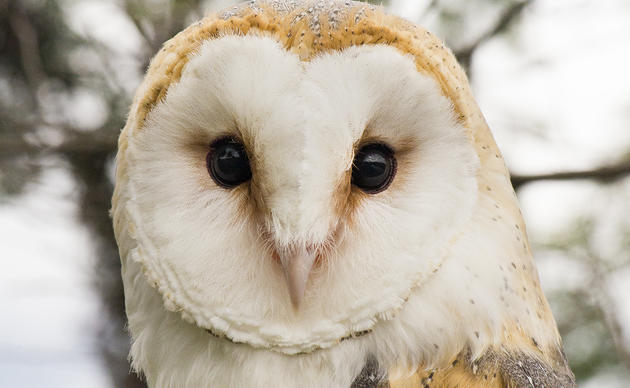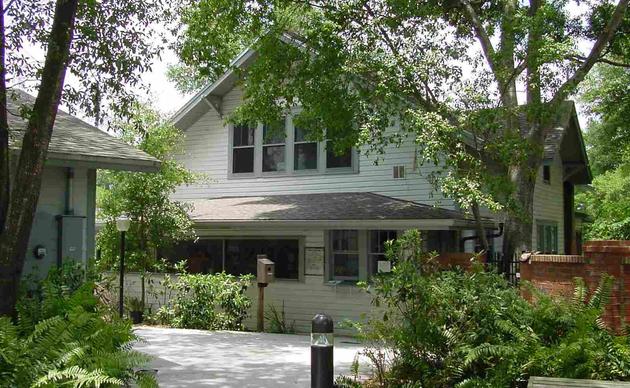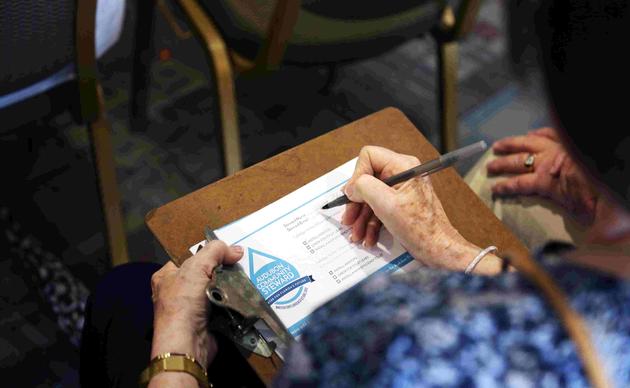For Amanda Chung, there was no experience like releasing a Red-tailed Hawk at a county park, the same bird she cared for as an intern at the Audubon Center for Birds of Prey in Maitland, Florida. "It is truly amazing how resilient these birds can be," she said, after that first experience. "Even major injuries, such as broken bones, can heal over the course of just a few weeks."
On day one, a typical intern like Chung doesn't know a falcon from a hawk, much less how to care for an injured one. After four short months of training, Animal Science Clinic Interns at this Audubon facility are assessing trauma, giving injections, bandaging wounds, conducting lab tests, and assisting with x-rays. Ultimately, the interns leave with hands-on experience and wide-ranging knowledge of raptor care. Although their subsequent career paths vary widely, many former interns report that their experience at Audubon has been valuable and sometimes even life changing.
Each year Audubon hosts six interns at its Maitland clinic. Over the course of that year, approximately 700 sick and injured birds of prey will enter the clinic for a wide variety of reasons including broken bones, infections, fishing line entanglement, eye trauma, and injuries sustained by baby birds who fall from their nests. The primary goal of the internship is learning how to treat these birds and understand the best clinical practices for their recovery.
Typically, the interns are undergraduate students or recent college graduates, often in the fields of biology or environmental studies. All are interested in animal care, and some already have their sights set on becoming veterinarians. Over the years, it has been an extraordinary success.
Of the almost 50 interns who have completed the program, 18 are currently veterinarians or attending veterinary schools. Twelve others are employed in positions directly related to animals including wildlife rescue and rehabilitation, raptor research, falconry, or as veterinarian technicians. Several former interns now work in health and science related fields, including nursing, microbiology, and public health, while others are educators.
As an undergraduate student, Jessica Bowling (intern '14) was interested in veterinary medicine, and believes that the internship not only gave her essential clinical skills but also contributed to her admission into veterinary school.
Emily Kirkman (intern '14) was also interested in becoming a veterinarian, but reports that the internship "gave me a unique opportunity to explore a side of veterinary medicine [wildlife care] I had not thought about." Since starting veterinary school Emily takes every opportunity to learn more about wildlife medicine and recently spent three weeks in South Africa working with a wildlife veterinarian and the distinctive animals of that country.
While some interns know that they want to become veterinarians, others are still figuring out their career paths. The experience helps define their courses of action. Jasmine Noval (intern '15) says that her time as an intern "helped me realize that I wanted to get into animal rehab work or zookeeping." Jasmine currently works as a zookeeper in Flamingo Gardens in Davie, Florida.
Parks Weatherford (intern '13) knew that he liked science and medicine, but he was unsure of his future plans. His time spent as an ACBOP intern "was my first exposure to veterinary medicine and wildlife rehabilitation. I found out that I love veterinary medicine." Parks attended vet school at the University of Florida and will become a licensed Doctor of Veterinary Medicine in May 2020.
The successful Audubon Clinic Intern program was officially established in 2010. A few individuals had interned at the Center before that time, but growing interest in the program and its potential benefits suggested that a more formal program be adopted. The program now consists of three four-month internship sessions per year, generally coinciding with school schedules. Each intern works three days a week. After a rigorous and competitive application and interview process, the Center chooses and trains two clinic interns during each session. Candidates for the program must exhibit a commitment to animal care, a desire for learning and expanding their skills, and the capacity to work hard.
According to Audubon Rehabilitation Supervisor Dianna Flynt, "raptor rehabilitation is a family enterprise; everyone who works and volunteers at our Center, and in this specialty, are part of that family. We freely share our knowledge of raptor care rehabilitation and when we choose interns, we choose candidates who demonstrate that they, in turn, plan to use and share the skills and knowledge they acquire while at the Center."
The internship experience provides distinct challenges: the manual labor of caring for injured wild birds, as well as the academic study of bird anatomy, medications, and diagnostic exams. ACBOP staff Samantha Little, Certified Veterinary Technician, and Beth Lott, Raptor Clinic Technician, are the primary intern instructors. Under their expert guidance, interns learn to handle raptors in a manner that is safe both for the birds and the human caregiver. Feeding, cleaning kennels, and daily operation of an effective clinic are unending tasks. Under the supervision of the clinic staff, interns learn to administer correct doses of medicines, diagnose problems, perform laboratory tests of blood and fecal samples, and even perform necropsies when necessary. From the first day, interns are thrust directly into bird care.
In this unique situation, interns continually learn to assess injured and sick birds. This hands-on experience of working with patients at ACBOP "helped me make the transition from thinking like a student to thinking like a doctor," said Sonal Petal (intern '15).
Skills learned at Audubon are valuable even when avian rehabilitation is not a former intern's primary work. Small animal veterinarian Madison Washington of Raleigh, NC (intern '13) appreciates that she has the expertise to provide medical care to injured raptors brought to her practice, so that the birds can be medically stabilized before being transferred to a local wildlife rehabilitation specialist.
Abby Henry (intern '15) is a third-year student at the University of Glasgow School of Veterinary Medicine. She reports that she was delighted to realize how much she learned and retained from the Audubon internship when she needed to treat a Black Eagle at the Johannesburg Zoo for chronic liver disease and gout. Her avian care skills were also put to use conducting physical examinations on numerous owl species.
Jennifer Law (intern '17), says her avian skills are frequently put to use, even though her primary job now is as a herpetologist at the Frost Museum of Science in Miami. She is called upon whenever help is needed with birds of prey or veterinarian lab work at the museum and reports that she is "the go-to person" whenever their staff veterinarian is not available. She also enjoys educating guests about birds of prey and their ecological role.
Current intern Clay Wilburn says that he did not expect to see so many injured birds come in to the clinic on a weekly basis and is amazed at the constant progress of the birds from medical treatment on to rehabilitation then to flight conditioning and ultimately, release. Before starting the internship Clay's interest was primarily in wildlife field research, however his experience at Audubon has added wildlife rehabilitation as possible career pursuit.
Whatever the career path, all interns at the ACBOP learn not only about animal husbandry and the medical aspects of treating sick and injured birds of prey but also about avian conservation and the problems that wild birds encounter, many of which are caused by human activity. These issues include habitat loss due to development or climate change, polluted water and food sources, nest disturbances, man-made obstacles such as barbed wire fencing and litter (especially improperly disposed fishing line), and collisions with buildings and vehicles. In some instances, birds are maliciously harmed by humans. Educating interns about these issues so that conservation knowledge may be passed along is an extra benefit of the internship program.
ACBOP Executive Director Katie Warner reports, "we have had the opportunity to host many talented individuals, who are now practicing veterinarians, teachers, and wildlife scientists. Their experience here is like no other; learning and interacting with these sick and injured birds of prey allows them to be part of the solution in healing, treating, and releasing these birds back into the wild. Our goal is to create a pathway for these individuals to pursue career opportunities and be a part of the larger Audubon network to conserve birds and wildlife."
"This internship was a cool experience," said Jessica Bowling, currently enrolled at St. George's University School of Medicine in Grenada. "How many people can say that they have gotten to work with eagles, hawks, or owls? I am thankful for the opportunity and wouldn't trade it for the world."
Parks Weatherford, the soon-to-be licensed DVM, says "I'm very lucky to have found a career which I love, and I'm grateful for the Center for Birds of Prey for starting me down this path."
Interns like Weatherford and the others are seizing the chance to make the most of their skills and experience, thanks to this unique opportunity provided by Audubon that teaches and fosters upcoming generations of raptor care specialists and wildlife conservationists.
Many thanks to the past and current interns who provided information that contributed to this article, including Daphné Amozig, Jessica Bowling, Adina Bronstein, Amanda Chung, Paige Hanson, Abigail Henry, Emily Kirkman, Jennifer Law, Robyn Lee, Kelly Locke, Eric Los Kamp, Brianna Millevoi, Andrew Thompson, Jasmine Noval, Jessica Penrose-Ross, Sonal Petal, Madison Washington, Parks Weatherford, and Clay Wilburn.



